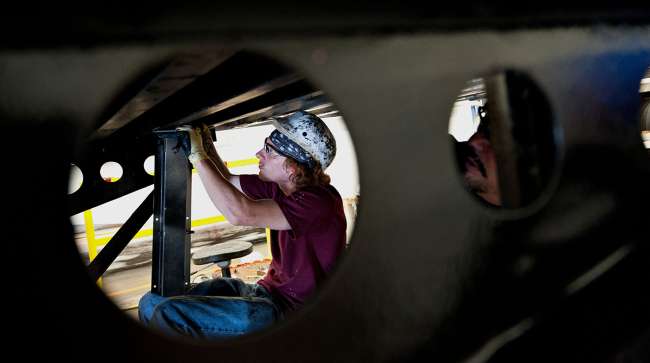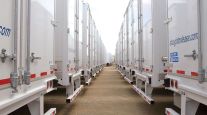Senior Reporter
Trailer Orders Fall for Fourth Straight Month

[Stay on top of transportation news: Get TTNews in your inbox.]
U.S. trailer orders in August bounced along below 11,000 units for the fourth consecutive month and were 72% lower than a year earlier, according to ACT Research, amid near-record factory inventories of undelivered trailers, plus plentiful cancellations.
ACT said net orders totaled 10,600. That compared with 38,275 a year earlier.
Cancellations continued in the industry’s core product categories, dry vans, reefers and flatbeds, according to ACT, and reached 4,200, with a little more than 2,800 coming in the dry van segment.

In our first episode of RoadSigns, Season Four, we ask: What Does the Future Hold for Truck Platooning? Hear a snippet from Cetin Mericli, CEO and Founder of Locomation, above, and get the full program by going to RoadSigns.TTNews.com.
Roughly a year ago, fleets were concerned about finding enough slots in 2019.
“From an orders standpoint, now, the pendulum has swung more to advantage fleets,” said Frank Maly, director of commercial vehicle analysis and research at ACT.
WANT MORE NEWS? Listen to today's Daily Briefing
That advantage includes favorable pricing and delivery dates — a little of everything, he said.
Cancellations have come from the for-hire sector, for the most part, said Craig Bennett, senior vice president of sales at Utility Trailer Manufacturing Co.
The private fleets and leasing companies are continuing to buy as needs dictate. Flatbed demand is very soft still, he said.
“Remember that we have built record, and high, numbers of trailers for several years now. It remains to be seen what the actual yearly market demand for trailers really is in this new age — of last-mile, Amazon and double-stack container transportation — that we are in now,” Bennett said.
Meanwhile, Maly said July’s factory inventory was the highest ever, and “came down just a hair in August.”
Dealers’ inventory is high, too, based on anecdotal reports, he added. “There is a lot of inventory in the pipeline and that, in and of itself, can cause issues with production.”
The current build rate is about 29,000 units a month, which extends the backlog only until January, he said.
“Typically when demand softens, trailer makers lay off workers and otherwise cut costs beginning with marketing, then R&D, then secondary clerical staff, etc. The object of the exercise, in our notoriously cyclical industry, is to survive. ‘He who fights and runs away, lives to fight another day,’ ” said Charles Willmott, CEO of consultancy WillGo Transportation.

Willmott
Willmott suggested a shakeout is coming among trailers makers if production drops sharply from current levels over the next few years, as he expects.
FTR forecast U.S. trailer production to fall 16% to 275,000 in 2020 compared with an expected 326,000 this year.
FTR pegged net orders in August at 10,400.
“Numbers are supposed to be down in the summer. The only thing it tells you is that 2020 is not going to be a booming year like 2019. But if we look at the economy and freight cycles, we already knew that,” said Don Ake, vice president of commercial vehicles at FTR. “So then it becomes, is 2020 going to be a decent year or are we going to start going into the tank.”
The first indication on that will be a spike in October orders, or not, he said.
Wabash National Corp., reported its cancellations remain in the normal range.
Wabash CEO Brent Yeagy said about cancellations, in general: “It’s a spot rate phenomenon, and that’s affecting some of the smaller customers out there. I think the other thing that you’re seeing is that some of our competition decided to take maybe a higher level of speculative order that went into 2020.”
“We manage the robustness of a firm order differently as a publicly traded company,” Yeagy added during the company’s most recent earnings call.
David Gilliland, vice president of national accounts at Great Dane, said he expects the order intake to be steady throughout the balance of 2019 and into early 2020. “We do need to keep in mind that as an industry we are coming off of all-time record high order intake.”
David Giesen, vice president of sales at Stoughton Trailers, said that demand is moving toward normal, and he expected orders to rise in the next couple of months.
“That said, the industry has a serious overcapacity situation with the capacity added in the last 24 months, compared with what the actual demand going forward will be,” he said.




